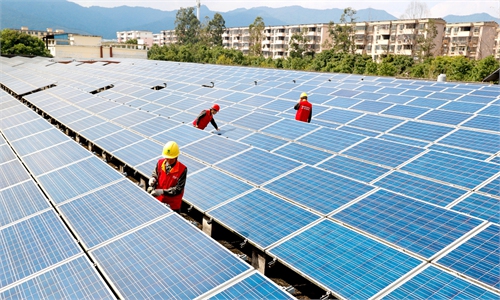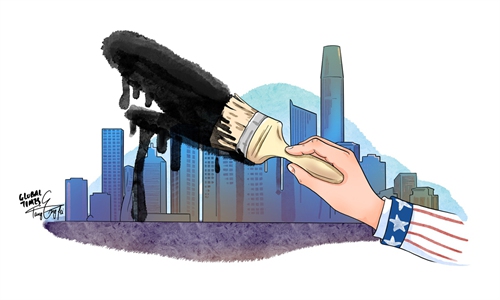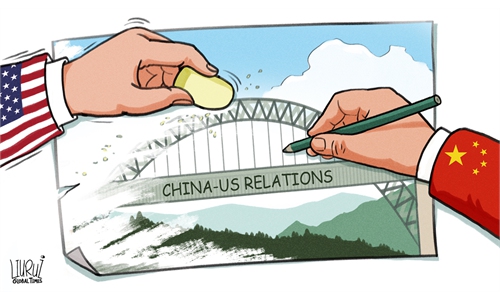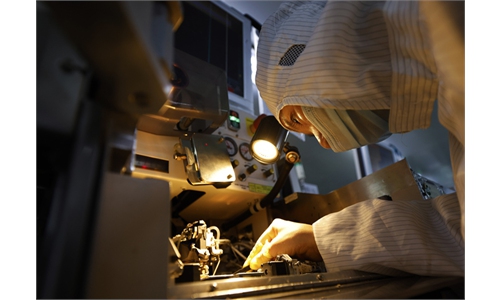China-US biz community upbeat after Xi-Biden meeting
Washington urged to show greater ‘sincerity’ for better cooperation
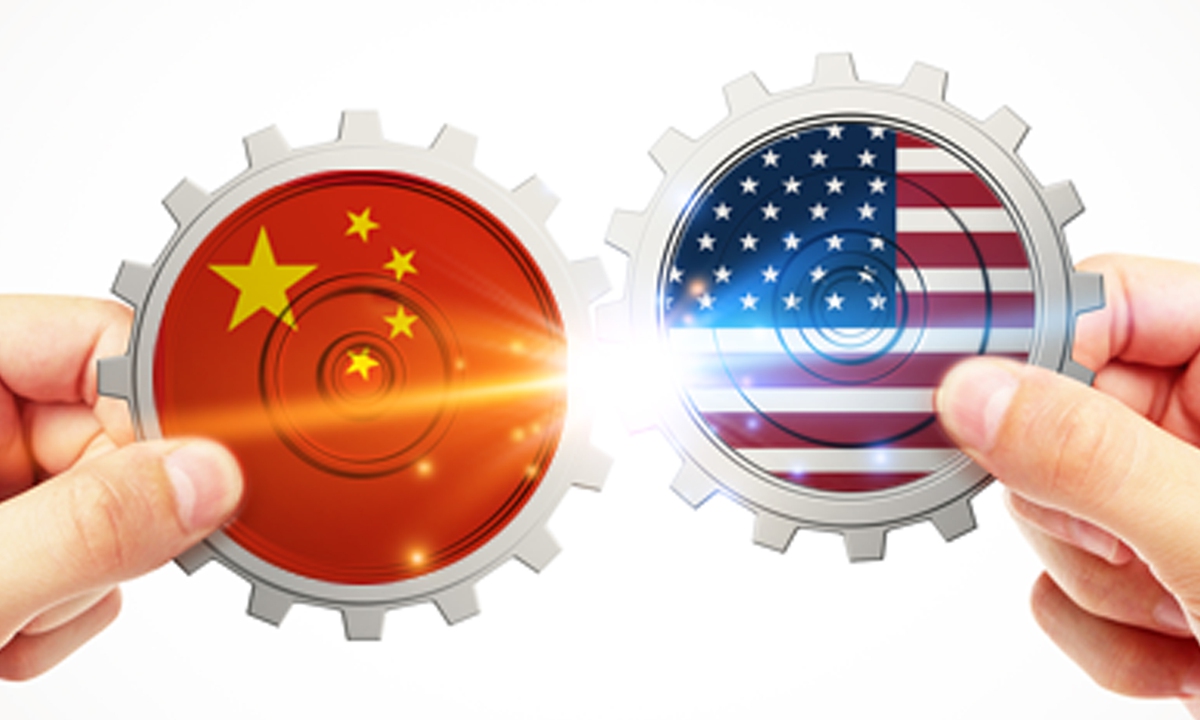
China-US Photo: GT
Business communities in China and the US have expressed their excitement over the first virtual face-to-face meeting between the two countries' top leaders, as they hope the world's two largest economies can move forward on more sectors that could bring trade ties back on track. Nevertheless, industry players from the two countries urged Washington to do more, from removing unreasonable tariffs to stopping its bullying of Chinese firms so that the two could conduct follow-up negotiations as soon as possible.
"It's a positive signal for China-US economic and trade cooperation. Members of our chamber said they have seen the 'dawn for an easing of relations' between the two countries and a sign of strengthened cooperation. This exciting news has greatly encouraged everyone," Xu Chen, chairman of the China General Chamber of Commerce-USA (CGCCUSA) told the Global Times in an exclusive interview on Wednesday.
Lasting about three-and-a-half hours, the long-anticipated meeting between Chinese President Xi Jinping and US President Joe Biden stopped short of trade negotiations. The two sides discussed trade and economic issues of mutual concern, and reached a consensus on ramping up communication on each other's macroeconomic policies.
China also agreed to upgrade a "fast-track" arrangement to make it more convenient for the US business community to travel to China.
"A fast-track travel proposal is something that we've been working on for months with Chinese authorities, and we're very happy to see President Xi refer to this as a priority," Greg Gilligan, AmCham China Chairman, told the Global Times on Wednesday.
Establishing a fast track can alleviate practical difficulties encountered by the two countries in investment and trade cooperation, and facilitate exchanges between Chinese and American business people, and help boost the economic recovery of the two, said Xu, who's also president and CEO of Bank of China USA.
The US-China Business Council (USCBC), an advocacy organization representing more than 260 member companies that do business in China, said it hopes separate meetings will be organized to discuss economic and trade issues between the US and China.
"Given that US-China economic and trade ties have been a ballast of the relationship and can help manage strategic risks, we hope separate meetings will be scheduled soon to discuss economic and trade issues with China," said Craig Allen, president of USCBC, in a statement on Tuesday.
Global financial markets also edged up on Tuesday on the heels of the meeting, with onshore and offshore yuan surging to new highs. Observers saw the meeting as a boost to global financial markets, as it injected certainty into the future of China-US relations as well as the global economy that's been battered by the pandemic and a broken industrial chain.
US turn to correct mistakes
It is expected that the exchanges between economic and trade officials from the two sides will accelerate. However, the US still needs to make more efforts to fully normalize economic and trade cooperation between the two countries, Dong Shaopeng, a senior research fellow at the Chongyang Institute for Financial Studies at Renmin University of China, told the Global Times on Wednesday.
Tariffs and unfair treatment of Chinese firms should be the most severe mistakes for the US to correct, analysts said.
"It should be noted that trade between China and US should be equal and mutually beneficial. We should open up, and so should the US. At the same time, the US should abandon its long-arm jurisdiction and unreasonable restrictions and suppression of Chinese high-tech enterprises," Dong said.
At Tuesday's leaders' meeting, Xi stressed that economic and trade issues between the two countries should not be politicized and urged that the US should stop abusing or overstretching the concept of national security to suppress Chinese businesses.
Although the US did not respond to China's concern on a unilateral crackdown of Chinese tech firms, there is limited number of cards in the Biden administration's hand to deter an irreversible trend of bilateral tech cooperation, an industry insider at a leading Chinese tech firm, who prefers not to be identified, told the Global Times on Tuesday.
"Any further moves targeting Chinese firms would trigger a wave of objections from US businesses and capital markets, and the Biden administration shall trade off its tech approach to China very carefully," the insider said, while stressing that in the tech sphere, China and the US have not reached the stage of "starcraft," and only cooperation could reduce costs.
"China will have more bargaining chips to negotiate with the US as our tech industry rises," he added.
Chinese businesses in the US also warned that the US' arbitrary crackdown on Chinese firms has affected their confidence in the US market, and hope for a fairer and stable business environment. "An uncertain environment in the US market will also weaken Chinese firms' confidence, and affect their support for US subsidiaries' operations, expansion, and investment in the US," Xu told the Global Times.
Fire in the backyard
Analysts and observers said whether on tariff reduction or more economic policy coordination, the US is in a more eager need than China, which urged the US to take more initiatives and show greater sincerity to improve ties with China.
In the face of rising inflation, the US called for more economic policy coordination during the meeting, while Beijing urged the US to properly manage the spill-over effect of its macro policies, analysts said, such as the Federal Reserve's extraordinarily loose monetary policy.
A day ahead of the meeting, US Treasure Secretary Janet Yellen told CBS that removing tariffs that the Trump administration imposed on Chinese imports "would make some difference" to inflation, and added that US Trade Representative Katherine Tai was "revisiting" the phase one trade agreement with Beijing.
USCBC pointed out in the statement it hopes to discuss moves to reduce US and Chinese tariffs. USCBC and 25 other business groups sent a letter to Yellen and US Trade Representative Katherine Tai last week, calling for reducing Section 301 tariffs and broadening the tariff exclusion process.
According to USCBC, exports to China support roughly one million American jobs, with China ranking as the US' third-largest trading partner.
Analysts also noted that the lead-in to the passage of the $1.2 trillion US infrastructure bill, though designed to counter China, may also need China. Activity will rise, which means more machines are needed amid global shortages. Without the machines and parts from the "world's factory," it will be hard for Biden to get it going.
Starting from the US' own interests, it is a better way to end the trade war it has initiated which has lasted more than three years, Mei Xinyu, a research fellow at the Chinese Academy of International Trade and Economic Cooperation of China's Ministry of Commerce, told the Global Times on Wednesday.


